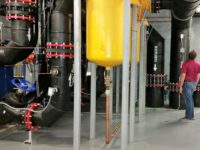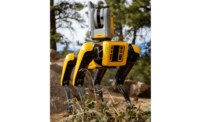When every second counts, there is no time to waste clearing snow or ice.
That’s why the team at Boston MedFlight decided to install snowmelt products at its new headquarters and operations center at Hanscom Field in Bedford, Massachusetts.
Viega got the call for snowmelt and radiant heating products that are used inside the hangar and building. In fact, the use of Viega’s Climate Mats, pre-constructed rolls of radiant tubing, were used — a first in Massachusetts, the manufacturer notes.
CSI Engineers worked on the $17 million Boston MedFlight project, which includes the 20,000-square-foot hangar. Jason Churches was the engineer for the project design and had previous experience with Viega, and also knows his local Viega technical managers, Reid Goodrich and Paul Jappe. They suggested Climate Mat.
“Reid brought it to the table and presented it to us,” Churches explains. “He helped with the design and the layouts for the radiant and the manifolds and everything that we used. It was a great way to save time and money by putting this in.”
Because the hangar for Boston MedFlight’s helicopters was fairly square in size, pre-constructed roles of radiant tubing were simple to execute and easy to work with. Mike Bafaro, vice president for J.J. Bafaro Mechanical Contractors who worked on the project, says although they had done radiant projects before, none were to this large a scale, and they had never used a product like Viega’s pre-constructed rolls. The snowmelt tubing for the helipad was installed conventionally, Bafaro notes.
“We knew Viega designed the project and we knew Reid had worked with the engineer on the initial design, but one of our biggest questions was the labor factor of putting it in,” Bafaro explains. “Certainly now, seeing the install being done and the labor savings, we would definitely use the product again. It worked great, the installers loved it and we would not hesitate to use it again.”
While radiant products indoors keep the temperature in the hangar comfortable for workers, the snowmelt products outside are what really shine. For a medical nonprofit organization such as Boston MedFlight, snowmelt wasn’t just a perk. It was practically a necessity.
“Everyone wants to do snowmelt until they often realize that it might be cost prohibitive,” Churches says. “But with this being a life safety point, it’s a no brainer. If you can’t get a plane or helicopter out because of snow, that’s a problem. And you can’t put things like rock salt on a helipad. Snowmelt just makes sense.”
Nearly 21,000 square feet of radiant was installed, including 18,000 square feet in the main hangar done with the pre-constructed rolls. There is nearly 10,000 square feet of snowmelt, most of it in front of the main hangar doors. There are nine Viega mixing stations with actuators (one for each manifold for the radiant system). Viega press-joining systems also were used for plumbing within the facility.
J.J. Bafaro did the controls, and wiring and balancing of the system, but subcontracted piping systems to do the actual installation of the radiant and snowmelt systems. Although Bafaro wasn’t directly involved in the installation, he says it was easy to see the benefit of Viega and the Climate Mats.
“Extreme labor savings,” he simply retorts. “You’re rolling out these mats vs. doing all the individual tubing, and that’s a huge number. It made sense with that large of a square-footage area, and because it was shaped like a big square.
The mats were the best application, and I’d recommend it to anybody looking to do an install of this type.”
Design for the Boston MedFlight Headquarters and Operations Center started back in 2016, with construction ramping up in 2017. A ribbon-cutting ceremony was held this past November to celebrate the opening of the 54,000-square-foot facility.
Boston MedFlight is the region’s primary provider of critical care transport by air and ground. The nonprofit cares for more than 4,500 patients each year. World renowned, the program was established by a group of Boston’s leading academic medical centers and partners with community hospitals, pre-hospital providers, including fire departments and EMS services, as well as other air medical programs across the region.




